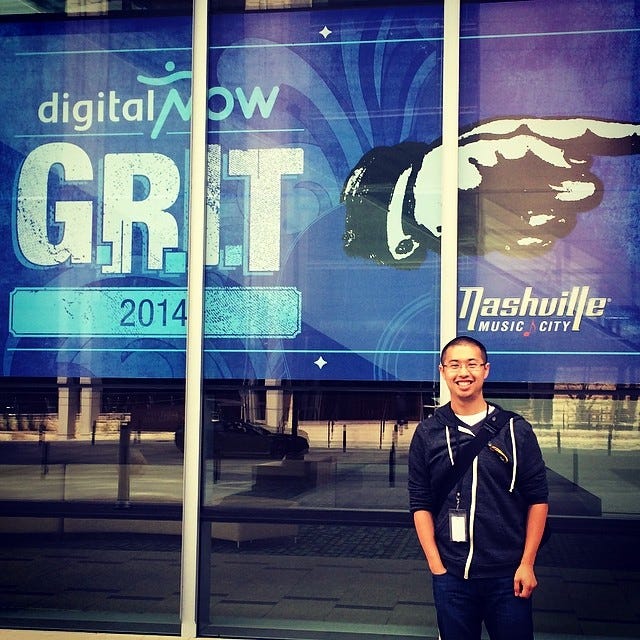#89: What Do You Want To Be When You Grow Up?
The Case For More Opportunities For Career Exploration and Navigation
Hello, and Welcome to All The New Subscribers. Feel free to drop me a note (alex dot dea at gmail) to say hello.
Here is what we got this week:
The Need For More Career Exploration
What We’re Watching
Career and Leadership Advice
🔎1.The Need For More Career Exploration🔎
When I was 5, I told my parents I wanted to be a firefighter, engineer, an astronaut, and to get an MBA. While I only went 1 for 4, to me, the most compelling part of that statement wasn’t that I wanted to do or be any of those things, but the fact that I knew what an MBA was when I was five years old.
This isn’t exactly a surprise. Both my parents got MBAs and built careers in the corporate sector. They also talked to us about the importance of education and encouraged healthy discussions around our interests and curiosities early in our lives.
When I was 12, I started going to my Dad’s work conferences and in exchange for getting a trip to Disneyworld I would do odd jobs around the conference like printing out badges and running registration. This put me in contact with leaders of organizations, non-profits, leaders, and many others, many of whom had MBAs and many who did not. I would often ask them questions about their jobs and careers and the the two main takeaways I got out of it were:
Whatever you do, hard work is important but so are the relationships you have with other people
Opportunities don’t always appear out of mid-air, if you want opportunities you gotta put yourself in positions to find them
I have been reflecting on this because of the recent article that came out this week in the WSJ courtesy of Lindsay Ellis about the declining volume in MBA applications to full-time MBA programs during the last admissions cycle.
There’s a lot of reasons why admissions officials think this happened, ranging from economic factors to price, to better alternatives that professionals have right now in competitive labor markets.
All of those play a role, but as someone who thinks a lot about where things are headed and trying to take the long view I’m thinking broader about the awareness (and oftentimes, lack thereof) around career exploration, career exposure and career experiences.
One of the many conferences my Dad took me over the years
Regardless of where you sit on the nature vs nurture spectrum, how we see the world and what we see in it is often shaped by the environments we’re in and the influences we get. This is why it’s no surprise to me why I opted to not only get an MBA, but also that even through my own challenges and missteps along the way, I figured out ways to chart my course, explore opportunities and navigate my career.
But not everyone has the luxury of sitting around the dinner table to talk about advanced degrees, or getting to attend conferences with seasoned business leaders who are sharing wisdom and advice and opening you up to ideas that you couldn't get otherwise.
I already shared a lot of thoughts on what I think short and long term needs to happen with the MBA degree, but I think the bigger issue here is that we’ve still got a long way to go and a lot of work to do to exposing people to opportunities and information about careers, giving them tools and time to explore career paths and curiosities, and providing “career readiness” and actual toolsets to help them navigate the workplace so they can choose for themselves if things like an MBA or other career accelerators are a great fit for them.
Make no mistake, this is a tall order, and not something that falls squarely on the shoulders of one institution, or even one part of society. Although there are some bright spots emerging.
For years, nonprofits like Consortium, Forte, ROMBA and Management Leadership For Tomorrow have been going out to educate underserved and underrepresented populations about the potential and power of an MBA degree, and then providing resources (both financial and social) to help them become MBA graduates and future business leaders. “You cannot be what you can’t see” is the approach of many of these non-profits, and getting more underrepresented individuals into leadership roles helps beget success.
On the Workforce Development front, Non profits, like Year Up, Climb Hire, and others are also doing great work in exposing individuals who are underserved with potential economic and career opportunity with technical and soft skill training in fields like IT, project management and cyber security at top firms like Facebook, Salesforce and Morgan Stanley.
Within Corporate Benefits, Guild Education has made inroads in the employer tuition benefits space, working with large companies that provide tuition and professional development to hourly workers to help unlock those benefits to be used on accredited degrees that in turn provide hourly workers with career and financial mobility.
And in the early career talent space, companies like Multiverse are reinventing and scaling apprenticeship opportunities across Europe and the United States, and micro internships and work-study opportunities through companies like Pathmatch, Parker Dewey and Riipen.
Furthermore, companies like Forage are providing more career exploration and education opportunities with students, and enabling employers to recruit diverse talent who are curious and interested in their organizations.
These are just a handful of cherry picked examples, but we need more to keep moving the needle.
I’m a big believer that if you care about the long-term wellbeing of an individual or a more equitable workplace, one of the best things you can do is to teach them how to manage their career. While not everyone wants to give their life to their work, most of us spend a good portion of our life employed, and it is our means not just for self-actualization but for supporting our lives and having the financial freedom to live in a way that suits our best interests.
If you’re in a position like me where you’re surrounded by people who are going to talk to you about your career and give you learning and opportunities to explore and grow, you also are in a position to do the same for others, whether you’re a leader of an organization, a manager of direct reports, or someone who cares about their fellow colleagues or employees.
The Full-Time MBA is a career accelerator that helps professionals explore careers and launch their trajectory on their current path or into a new one. Whether the full-time MBA is right for you or not is besides the point - we all need career accelerators in the future of work, and we all have a responsibility to provide career readiness, exploration and experiences to the next generation of professionals.
👀 What We’re Watching 👀
Business School: The Job Market is a Problem For Top MBA Programs (WSJ)
This article picked up a bunch of steam in my network this week but the headline says it all. Application volume to top MBA programs is down in the last admissions cycle because more employees are hanging onto their current jobs or opting for better ones and pushing off school. While MBA applications regularly go through up and down cycles, typically during challenging economic times is when applications go up, although right now seems to be bucking the trend. Short term wise, schools seem to be measured in their approach to managing through this current cycle, but longer term, you have wonder for the full-time MBA degree where the next set of students are going to come from.
Future of Work: Polywork raises series B to add more hyphens to your job title (Techcrunch)
Back in the middle of September, Polywork, a professional network meant to provide a refresh on LinkedIn raised its series B and came out of its Private Beta. According to their Founder, If LinkedIn is meant to be the place for full-time opportunities, Polywork wants to be the place where professionals can find collaboration opportunities. Many of the people on Polywork right now are full-time employees who want to express themselves outside of their full-time jobs. I’ve been testing this myself, and am interested to see how companies like Polywork re-create LinkedIn for the new era of professionalism.
Early in Career Talent: What It’s Like to Graduate College in This Economy (Vox)
Some good insights into how college students are feeling about their job prospects and what they are looking for out of a job. There is also some data from Handshake, a college and early career talent recruiting platform around behavior data of its students and recruiter and employer trends.
Corporate Learning: Coursera Launches 200K Short-Form Videos to Accelerate Skill Development - Keeping attuned with the trends toward shorter form content, Coursera, which already has lots of learning content announced the launch of more short-form content targeted on key skills and topics for learners on it’s platform.
📙 Career and Leadership Content 📙
Podcast: Bet on Yourself to Accelerate Your Career Growth (MBA Insider) - Ann previously served as the Chief of Staff to Marissa Mayer, Jeff Bezos and Eric Schmidt, and recently published her book Bet on Yourself. In my conversation with Ann, we talked a lot about how she was able to navigate successfully in these roles and the career advice she has for people who want to advance in their career without following a set path.
Podcast: It’s Okay To Be Okay (The Inside Job) - One of my go to podcasts for workplace and leadership advice is The Inside Job. This episode does a great job unpacking a common refrain that I hear from friends as well as in the work that I do. What happens if I am happy with where I am at, and if I don’t necessarily have a goal in this moment? While it’s easy to assume that we all need to be a continuous mindset of growth, Eric and Nayla do a great job giving all of us permission to be right where we are, and to be okay with that.
Ambition is Out (Time Magazine) - Did you know there were people who studied ambition?! That’s one of the things I learned in this article.
Have a great week,
Al




